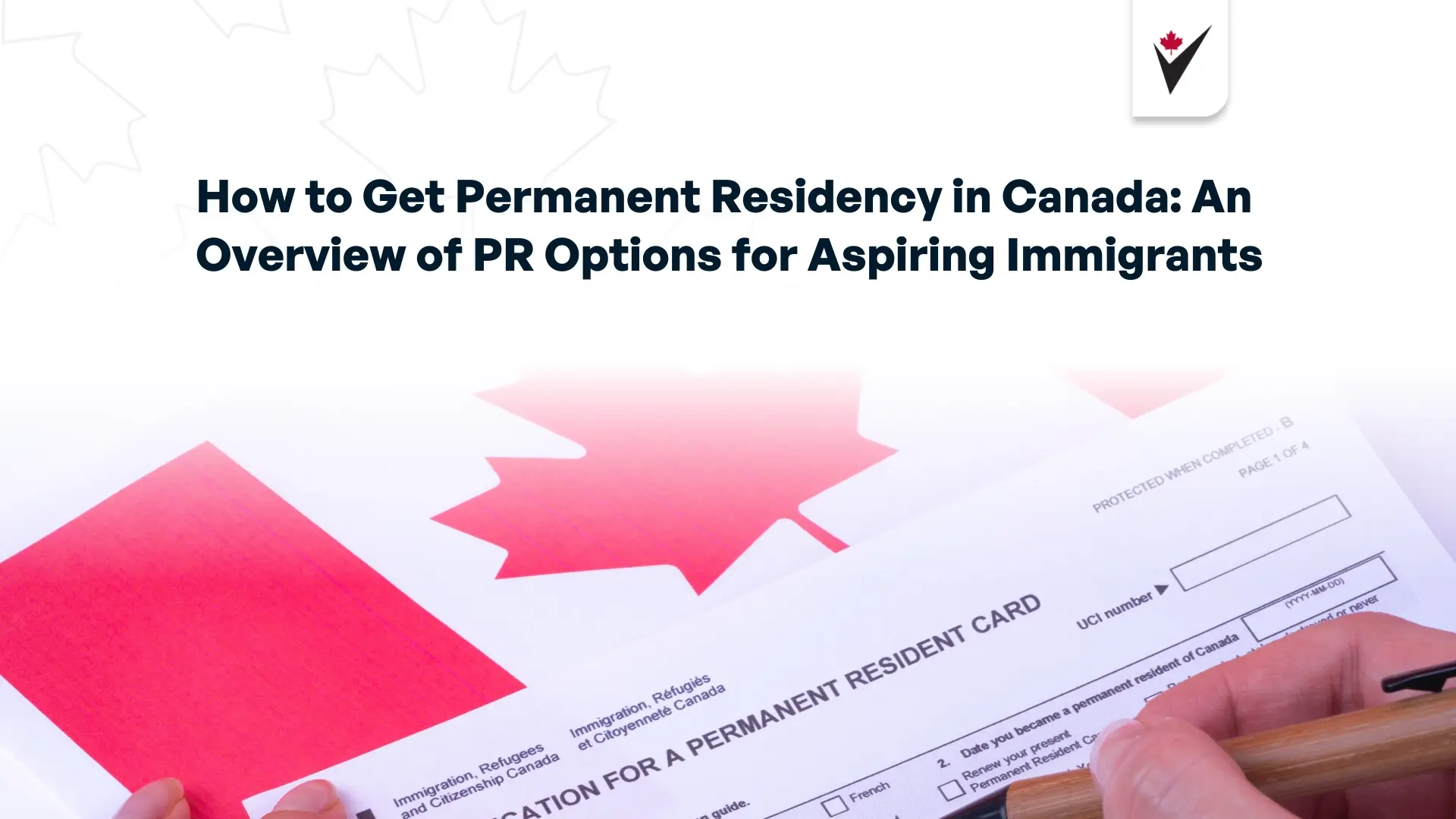How to Get Permanent Residency in Canada: An Overview of PR Options for Aspiring Immigrants

For many aspiring immigrants, the dream of building a new life in Canada begins with securing permanent residency.
Canada offers a welcoming environment, a high quality of life, and a wealth of opportunities, so it’s no surprise that it’s a top destination for immigrants worldwide. However, navigating the path to permanent residency in Canada can be complex, with various options to consider.
If you’re exploring how to get permanent residency in Canada, this guide provides a general overview of available programs to help you find the right fit for your Canadian immigration goals.
The Benefits of Permanent Residence in Canada
Becoming a permanent resident in Canada offers many advantages that make it a worthwhile pursuit. As a Canadian permanent resident, you gain access to:
- Options for Work and Study: The right to live, work, and study anywhere in Canada without needing additional permits.
- Social Services: Access to a range of social benefits, such as childcare assistance, unemployment benefits, and public pensions.
- Healthcare: Free or subsidized public healthcare services through Canada’s high-quality healthcare system.
- A Pathway to Citizenship: The opportunity to apply for Canadian citizenship after meeting residency requirements.
- Legal Rights and Protections: Protection under Canadian laws and the Canadian Charter of Rights and Freedoms.
Canadian Permanent Residence Options
Canada offers multiple pathways for obtaining permanent residency, each tailored to suit different skills, qualifications, and personal situations.
Here’s an overview of some of the primary options to consider.
Express Entry
The Express Entry system is one of the most popular ways to secure permanent residency in Canada. The program targets skilled workers who meet the labour market needs of the Canadian economy.
Eligibility and Requirements
There are various Express Entry pathways to consider, depending on your circumstances. Each program has its own eligibility requirements based on factors such as education, work experience, language proficiency, and adaptability.
- Federal Skilled Worker Program: For individuals with at least one year of continuous full-time (or equivalent part-time) skilled work experience in an eligible occupation within the past 10 years.
- Federal Skilled Trades Program: For skilled trade workers with qualifications and experience in specific trades.
- Canadian Experience Class: For individuals with at least one year of skilled work experience in an eligible occupation in Canada within the past three years.
A critical requirement across all Express Entry programs is ensuring your occupation aligns with a valid National Occupational Classification (NOC) code. NOC codes categorize jobs based on Training, Education, Experience and Responsibilities (TEER), and only certain TEER categories are eligible under Express Entry.
How to Apply
To begin, you’ll create an online Express Entry profile. Points are awarded based on several factors, including:
- Age
- Education
- Work Experience
- Language Proficiency (English or French)
- Adaptability (e.g., Canadian education, work experience, or a valid job offer)
Your score is ranked under the Comprehensive Ranking System (CRS). The highest-ranking candidates are invited to apply for permanent residency through regular draws. Meeting the eligibility requirements and accurately identifying your NOC code are crucial for maximizing your chances of receiving an Invitation to Apply (ITA).
Family Sponsorship
Family Sponsorship enables Canadian citizens and Canadian permanent residents to sponsor family members, including spouses, common-law partners, dependent children, and sometimes parents and grandparents, to become permanent residents of Canada.
Eligibility and Requirements
Sponsors must be at least 18 years old, be a Canadian citizen or Canadian permanent resident, or be registered under the Indian Act, and demonstrate the financial ability to support the sponsored person to ensure they don’t require social assistance from the Canadian government.
How to Apply
The sponsorship process involves two concurrent applications: the sponsor submits their intent to sponsor to Immigration, Refugees and Citizenship Canada (IRCC), while the sponsored family member applies for permanent residency. IRCC reviews both applications together, and if approved, the sponsored individual is granted permanent residency.
Provincial Nominee Programs
Each Canadian province has unique economic needs, which is why the Provincial Nominee Programs (PNPs) were created. Through these Canadian immigration programs, provinces can nominate individuals with the relevant skills who meet their specific labor market requirements and economic needs.
Eligibility and Requirements
While eligibility requirements differ for each provincial nominee program, applicants often need a valid job offer or work experience in a high-demand occupation. Proficiency in English or French and a commitment to settle in the province are typically required. Some provinces also prioritize applicants with family ties or previous study/work experience in the region.
How to Apply
Depending on the province, you can apply for a provincial program either through the Express Entry PNP stream (if you already have an Express Entry profile) or directly to the provincial government. Once nominated, you can apply for permanent residency through the federal government.
If you have an Express Entry profile, you can select the provinces or territories where you’d like to live. If a province sees you as a good fit, they’ll send you a Notification of Interest (NOI) through your Express Entry account. Once you receive an NOI, you can apply directly to that province’s PNP. If nominated, you’ll get 600 extra points on your CRS score, virtually guaranteeing an ITA for permanent residency.
You can also apply directly to a province’s PNP without going through the Express Entry system. If your application is approved, you’ll get a nomination certificate. From there, you can submit your permanent residency application to IRCC through the regular process.
Quebec Skilled Worker Program
If you’re aiming to secure permanent resident status and settle in Quebec, the Quebec Skilled Worker Program (QSWP) offers a unique pathway. Unlike other Canadian immigration programs, QSWP is tailored to meet Quebec’s specific economic and cultural needs.
It's important to note that this Canadian immigration program operates independently from the federal Express Entry system, and applicants must follow Quebec's specific procedures and requirements.
Eligibility and Requirements
The QSWP uses a points-based system to evaluate applicants based on their education, work experience, language skills, and other factors that align with Quebec’s labor market priorities. A minimum score is required to qualify, with additional points awarded for factors like a validated job offer in Quebec or having family members residing in the province.
Note that proficiency in French is a significant advantage, as Quebec places a strong emphasis on the French language.
How to Apply
You’ll need to submit an Expression of Interest (EOI) via the Arrima portal, managed by Quebec's Ministère de l'Immigration, de la Francisation et de l’Intégration (MIFI). The EOI includes information about your qualifications and experience. MIFI periodically selects candidates from the EOI pool based on Quebec's labor market needs and other criteria. Selected candidates receive an invitation to apply for a Quebec Selection Certificate (Certificat de sélection du Québec, or CSQ). Upon receiving the CSQ, you can then apply to the federal government for permanent residency.
Atlantic Immigration Program
The Atlantic Immigration Program (AIP) is designed to attract skilled workers to the Atlantic provinces of Newfoundland and Labrador, Prince Edward Island, Nova Scotia, and New Brunswick. This employer-driven program addresses specific labor market needs in these regions.
Eligibility and Requirements
To qualify for the Atlantic Immigration Program, you’ll need to secure a full-time, non-seasonal job offer from a designated employer in one of the Atlantic provinces, have at least one year of relevant work experience within the past five years, and hold a high school diploma or equivalent (with an Educational Credential Assessment for foreign credentials).
Applicants must also meet a minimum Canadian Language Benchmark (CLB) level 4 in English or French, provide proof of financial stability (unless already working in Canada), and obtain a settlement plan from a recognized service provider.
How to Apply
The AIP application process involves several steps: the employer must first be designated by the provincial government, after which they can extend a qualifying job offer to the candidate. The employer then helps the candidate secure a provincial endorsement, including a settlement plan. With the endorsement, the candidate applies to IRCC for permanent residency. For immediate employment, candidates may also apply for a temporary work permit while their residency application is processed.
How CanDo Immigration Can Help You Choose Which Canada Permanent Residence Option is Right for You
Given the variety of programs available, choosing the right pathway to becoming a permanent resident in Canada can be overwhelming.
That’s where CanDo Immigration comes in.
Our team of experts will guide you through the process of becoming a permanent resident of Canada. We take the time to understand your unique circumstances, helping you navigate the eligibility requirements and application process with confidence.
Contact us today to discuss your unique situation and take the first step toward achieving your goal of Canadian permanent resident status.



